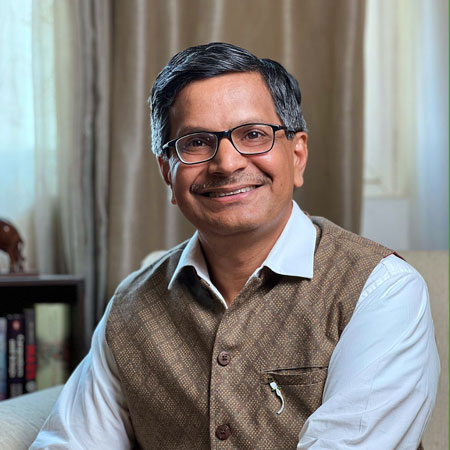Shraman Jha, CEO, Hindustan Unilever Foundation
Indians have done a wonderful job in translating climate change as Jal- Vayu Parivartan, which is change in water and air: Shraman Jha, CEO, Hindustan Unilever Foundation
Water is a very important issue because it is not an end by itself; it cuts across almost everything from human and animal health to livelihood and gender, Shraman Jha, CEO, Hindustan Unilever Foundation.

About The Episode
Welcome to the full Episode 18 of Sustainability Karma, India’s first and only talk show on sustainability on All India Radio.
In this episode of Sustainability Karma, Shraman Jha, CEO, Hindustan Unilever Foundation, talks about the importance of World Water Week 2024 and its theme Bridging Borders: Water for a Peaceful and Sustainable Future. He highlights the complex interplay between borders, peace, and sustainability, noting that water issues often transcend political boundaries and can be a catalyst for both conflict and cooperation.
Jha also mentions the recent water crisis in Bengaluru, India, which briefly dominated national headlines. Underscoring the ongoing and cyclical nature of water-related challenges due to too much or too little water, he says water remains a critical issue that needs continuous attention and management.
He explains that Hindustan Unilever Limited (HUL) chose to focus on water security as a core issue through its Unilever Foundation (HUF). This decision was made over a decade ago before India’s Corporate Social Responsibility (CSR) laws were enacted. Water security was chosen because of its broad impact on various aspects of life, including livelihoods, gender equality, health, and agriculture. HUL believed that their foundation could leverage its strengths to make a significant impact in this area.
Regarding the impact of HUF’s interventions, Jha acknowledges the limitations of a private foundation in a vast and diverse country like India. However, he highlights the foundation’s approach of experimenting with different solutions in various communities, learning from these experiences, and sharing these insights with other NGOs and foundations. The foundation’s goal is not just to provide more water but to ensure communities are water-secure, even after the programme ends.
One of the key metrics used to measure the foundation’s impact is “water potential”, which quantifies either the additional water made available or the water saved through improved practices. Over the past decade, HUF has achieved a cumulative total of 3.2 trillion litres of water potential. To put this in perspective, this amount of water could meet the drinking water needs of India’s entire population for two years. While Jha acknowledges that this is just a drop in the ocean compared to the overall needs, he believes it represents a strong start and provides a solid foundation for future efforts.
When discussing the Sustainable Development Goals (SDGs), Jha notes that water cuts across multiple SDGs, not just those explicitly related to water. Water is essential for poverty alleviation (SDG 1), zero hunger (SDG 2), good health and well-being (SDG 3), and gender equality (SDG 5). He emphasises that the gender aspect of water issues is often overlooked but is crucial, given that women are disproportionately affected by water scarcity.
He points out that awareness is the starting point for addressing water-related challenges. He drew a parallel with Mahatma Gandhi’s Dandi March, where the small gesture of picking up a fistful of salt symbolised a larger struggle and raised awareness among the masses. Similarly, he believes that awareness about water as a finite and precious resource is crucial. Once people are aware, small wins and community-driven successes can create a snowball effect, leading to broader and more significant impacts.
Referring to emission reduction dominance of global agenda, he says that water is an equally pressing issue that is deeply intertwined with climate change. In India, climate change is often described as Jal-Vayu Parivartan, which translates into a change in water and air. This phrase captures the close relationship between carbon and water, as changes in the climate directly affect water resources. Rising sea levels, salinisation of groundwater, and disruptions to the water cycle are all manifestations of climate change that are linked to carbon emissions.
He praises the growing emphasis on ESG (Environmental, Social, and Governance) issue, which now commonly include water management aspects like wastewater treatment and recycling. He believes that if all corporates, regardless of size, commit to their ESG goals and achieve small victories, it will significantly contribute to India meeting its international commitments.
Jha concludes by reflecting on the long-term nature of these challenges. The problems related to water and sustainability won’t end in 2030 or 2040; they require a fundamental shift in how we live and operate. The solutions must be inclusive, where everyone wins, as the issue of water security is one that impacts all of humanity.
In his closing remarks for World Water Week, Jha emphasises the importance of thinking ahead with the message Jal, Aaj or Kal, which means water for today and tomorrow. He urges everyone to become more conscious of his/her water use so that there is enough for everyone.

